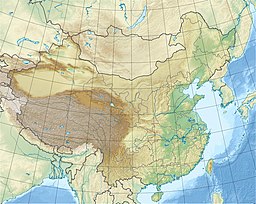Chao Lake
| Chao Lake | |
|---|---|
 Zhongmiao Temple on the north shore of Chao Lake | |
| Location | Hefei, Anhui |
| Coordinates | 31°30′N 117°30′E / 31.5°N 117.5°E |
| Basin countries | China |
| Max. length | 52 km (32 mi) |
| Max. width | 22 km (14 mi) |
| Surface area | 760 km2 (290 sq mi) |
| Average depth | 2.5 m (8.2 ft) |
| Max. depth | 5.0 m (16.4 ft) |
| Chao Lake | |||||||||
|---|---|---|---|---|---|---|---|---|---|
| Chinese | 巢湖 | ||||||||
| Literal meaning | Birds' Nest Lake | ||||||||
| |||||||||
Chao Lake (Chinese: 巢湖), also known by its Chinese name Chao Hu,[a] is a lake wholly situated in Hefei, the capital of Anhui Province. It is the largest lake in Anhui and one of the five major freshwater lakes in China.
Mythology
[edit]This section needs additional citations for verification. (December 2024) |
According to legend, the site of the lake was once a prosperous city named Chaozhou. Because of sins of its people, it was cursed by the heavens and ordered to be destroyed by flooding. The task was to be carried out by a white dragon, who was only able to find one good person, an old lady ("Lao" in Chinese) surnamed Jiao. After the destruction of Chaozhou, only the old lady and her daughter were saved. They became the two islands emerging from the lake.
This legend may be rooted in geological history, since Lake Chao is on the intersection of several major faults, of which the most famous is the Tan-Lu fault, which caused the great 1976 Tangshan earthquake in its northern section.
Tourism
[edit]Tourist sites around the lake include Mushan Island, Zhongmiao Temple, Tongyang River, Mount Yinping, and the Immortals Cave.[3] The silver fish, shrimps, and crabs of Lake Chao are called the Three Treasures; as such, the lake is nicknamed "The Land of Fish and Rice".[citation needed]
Pollution and rehabilitation
[edit]About 5 million people live near the lake and use it for irrigation, transportation, and fishing. Heavy use since the 1990s led to eutrophication and silting. Due to China's rapid economic growth, the lake became one of China's most polluted.[4]

For government authorities, the cleanup of the lake has been a top priority. The Chinese government borrowed from the Asian Development Bank a $250 million loan in 2011 to fund "investments in traditional environmental infrastructure, such as sewerage networks, wastewater treatment plants, and solid waste management" along with policy changes like discouraging use of chemical fertilizer among area farmers. According to an ADB press release in 2015, the program to clean up the lake has been successful based on "strong and consistent political leadership, integrated planning and analysis, effective management structures, and financial engineering."[5]
See also
[edit]- CNS Chaohu - Chinese navy ship named after this lake
Notes
[edit]- ^ Before the 20th century, its romanizations also included Tsaou Lake[1] and Tsiao Lake or Tsiao-hou.[2]
References
[edit]- ^ "China". Encyclopædia Britannica (9th ed.). 1878.
- ^ Brue, Adrien Hubert (1836). Carte Generale de l'Empire Chinois et du Japon (in French).
- ^ "Mushan Island Resort". China Daily. April 26, 2010.
- ^ Chen, Stephen (August 20, 2019). "Scientists find way to stop algae poisoning China's dirtiest freshwater lake". South China Morning Post.
- ^ "New Book Showcases Cutting Edge Reforms in Clean Up of Chao Lake". Asian Development Bank.
External links
[edit]- Ecology research project Archived 2020-09-29 at the Wayback Machine

